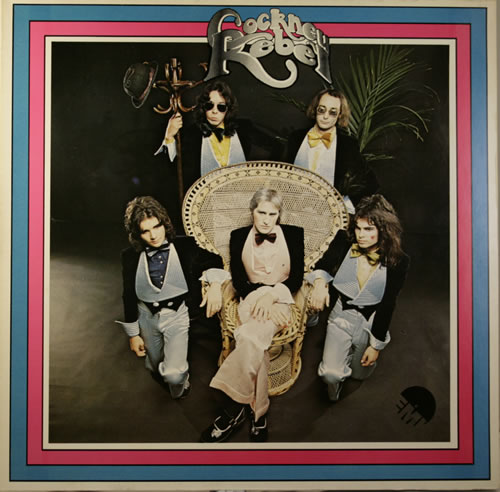The Human Menagerie (1973) ****
The reviewer is left stumped trying to describe this album. Not that the music itself is all that out-there; this is first and foremost a creamy pop album, gentle and strange and full of accessible melodicism (if non-obvious hooks; but a little work digs the hooks out eventually - and they're worth the digging). Making their entrance at the height of glam's heyday (just at the tail-end when the decline of glitter-rock as a commercial and artistic force was setting in) the Cockney Rebels bear some superficial similarities to early Bowie, Queen, and (especially) Roxy Music. But like Roxy, the glam tag only superficially suits them: the music is a mite too complex and art-rocksy (but definitely not prog), not to mention idiosyncratic, to fit comfortably within any genre boxes. Unless you count that vaguest of genre terms, Art Rock - yeah, that fits the bill. Or more precisely, Art Pop, since one of the album's gimmicks is No Electric Guitar! - instead, the primary stringed instruments are trusty acoustics and Jean-Paul Crocker's electric violin. The rhythm section don't so much rock as roll, adding a distinctly calypso feel to a number of tracks (dig those vibes). Add splashes of lounge-lizard keyboards and Steve Harley's distinctive tenor vocals, and you might begin to describe the basic formula - but your ears are better than my feeble words; this stuff is just too sui generis to peg. Harley's vocals are almost as idiosyncratic as the instrumental backing; perhaps a bit too Cockney for some, and he's definitely mincing some affectations in his enunciations, but much pleasanter on the ears than his closest cousin Bryan Ferry, and betraying a clear Ray Davies influence. And like the Kinks, Harley bears the distinctive stamp of (decidedly British) music hall, with an extra-strong dose of camp theatricality.
But unlike R. Davies, Harley's lyrics are anything but straightforward - on first scan (and second, and thirty-third) they seem like disassociated, randomly 'poetic' lines that make no literal sense but simply sound good. And half the time you'd be right. What does the gloomy epic (complete with 50 piece orchestra!) "Sebastian," mean, if anything at all? The way Harley portentously croons, "Someone called me Sebastian," with orchestral crescendos billowing behind the chorus, artificially inflate it to importance, but really - does even Harley himself understand what the song's about? "Your lips ruby blue, never speak a sound"? Harley's lyrics flow with the non-linear logic of dreams, and combined with the eccentricities of the music, give the album a bit of a surrealist feel. The album's other extended epic, the nearly 10 minute, "Death Trip," makes only slightly more (less?) sense, and contrary to title, isn't gloomy or gothy at all - just soft piano pop with sawing violin and orchestra surging in the background. The remaining eight songs are considerably shorter and poppier than those two epics, with the opener, the Spanish guitar driven "Hideway," being of particular excellence, and the weakest track, the fiddle-dance "Crazy Raver," being only slightly irritating and only slightly weak. Unless you count as weakest, "Chameleon," which at 49 seconds swings by too fleetingly to really register. "Mirror Freak," with its reference to a certain narcissistic elf, is indeed about Marc Bolan, for you rock trivialists. Appended to the reissue are two bonus tracks: the rhythmically intricate "Judy Teen," single, with the main hook residing in the stop-start of the rolling drums; and the B-side, "Rock and Roll Parade," which in actuality is more square-dancing fiddle-pop.
A very strong four stars, then - almost four and a half, but I like the next one even better.

No comments:
Post a Comment